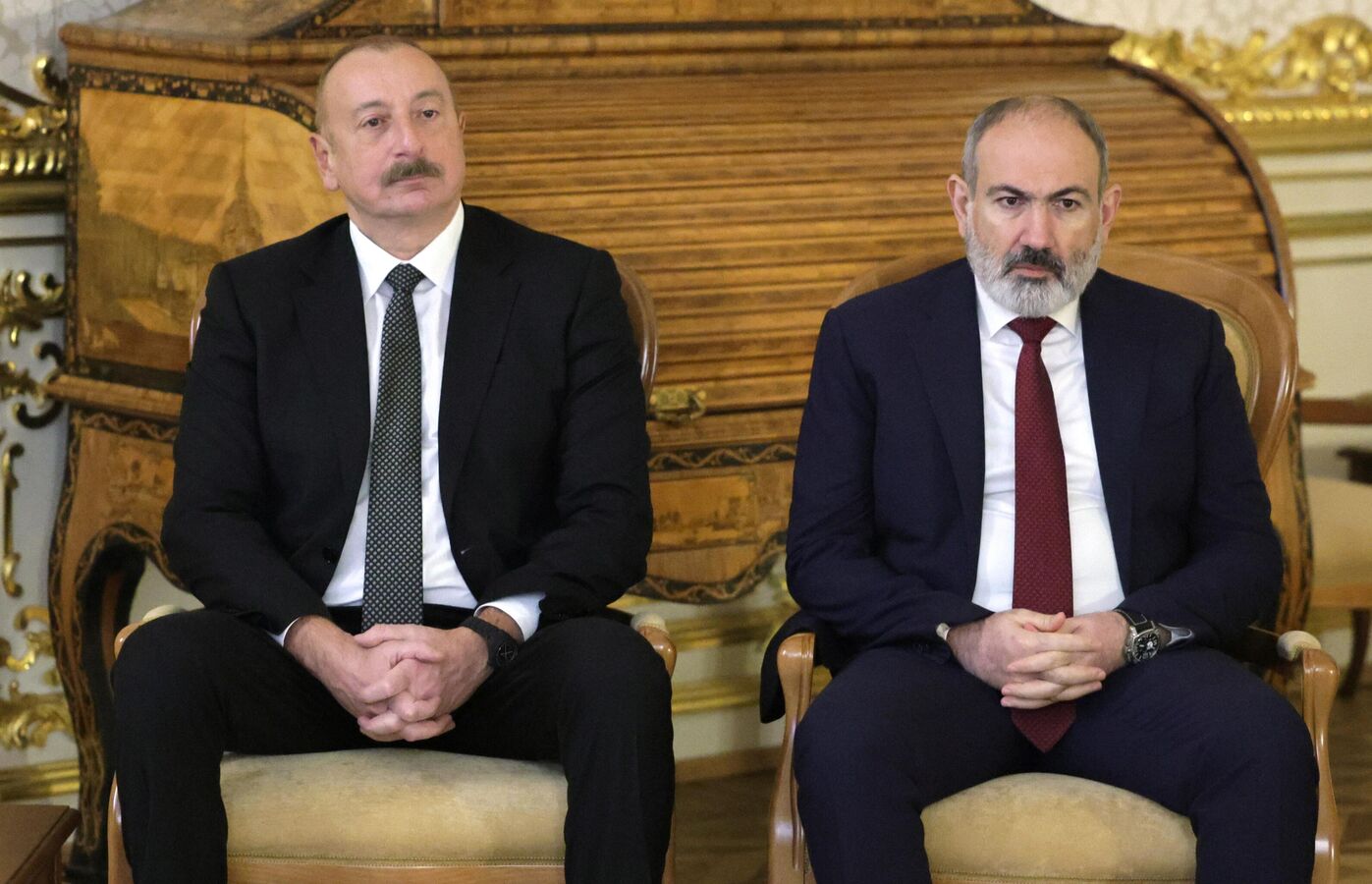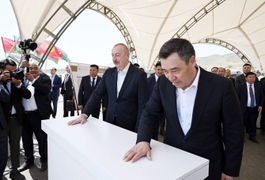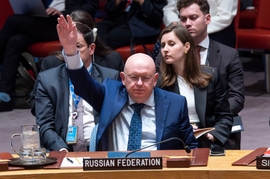Azerbaijan’s President Ilham Aliyev held an informal meeting with Prime Minister Nikol Pashinyan of Armenia on the sidelines of an informal CIS Summit in St. Petersburg, Russia, this week. The outcomes of the meeting on December 26 were not publicly disclosed; however, officials from Azerbaijan stated that the two leaders discussed the details of the peace agenda.
Elchin Amirbayov, Azerbaijani President’s Representative for Special Assignments, mentioned that Baku has been awaiting Yerevan’s response to its comments on the latest draft proposals.
“What is important to understand is that at this crucial stage in negotiations, where apparently we’re not that much far away from the final agreement, [is that] we do need a result-oriented exercise,” The Guardian quotes him as saying. “I know that that after three decades of negotiations and without no major result, there is a certain kind of fatigue and also frustration in both parties for how long we will continue just to see to meet each other without any reasonable results.”
Amirbayov recalled the five basic principles for normalization – mutual respect for each other’s territorial integrity, sovereignty and inviolability of international recognised borders; rejection of any territorial claims to each other, now and in the future; rejection of any acts that would run counter to UN charter, like the use of force or threat of use of force; delimitation of the interstate border; and opening of communication routes and ties – submitted by Baku to Yerevan in March last year as the keystone for the peace treaty.
According to him, a bilateral commission would be an essential mechanism to address all misunderstandings or differences in interpretations between Azerbaijan and Armenia.
Amirbayov noted that despite three years since assuming legally binding obligations, Armenia did not submit an action plan for restoring a transportation link through Armenian territory between the main part of Azerbaijan and its exclave of Nakhchivan.
“The linkage between Azerbaijan and Nakhchivan between two parts of Azerbaijan is crucial for us, in terms of national security, but also in terms of ensuring alternative route for the middle corridor. We cannot waste any more time. After three years Armenia has not even started a feasibility study for the 42km leg,” he said.
Earlier, President Ilham Aliyev said Armenia’s inaction to restore the transport connection on its territory has changed the initial plans.
“We had a plan to continue this road through Armenia, but Armenia refused it. So, we agreed with the Iranian side, and we’re already building a bridge for cars and then a bridge for trains to bypass Armenia and to build about 50 kilometers railroad on the southern bank of the Araz River,” President Aliyev stated.
Armenia and Azerbaijan had long been at odds over the latter’s Karabakh (Garabagh) region. Following the Soviet Union’s dissolution in 1991, Armenia launched full-blown military aggression against Azerbaijan, marking the longest and deadliest war in the South Caucasus region. The bloody war ended with a ceasefire in 1994 and saw Armenia forcibly occupying 20 percent of Azerbaijan’s internationally recognized territories. Over 30,000 Azerbaijanis were killed, nearly 4,000 went missing, and one million were expelled from those lands in a brutal ethnic cleansing campaign conducted by Armenia.
On September 27, 2020, the Armenia-Azerbaijan conflict took a violent turn when Armenia’s forces deployed in occupied Azerbaijani lands shelled military positions and civilian settlements of Azerbaijan. During counter-attack operations, which lasted 44 days, Azerbaijani forces liberated over 300 settlements, including the cities of Jabrayil, Fuzuli, Zangilan, Gubadli, and Shusha, from a nearly 30-year-long illegal Armenian occupation. The war ended with the signing of a statement on November 10, 2020, under which Armenia also returned the occupied Aghdam, Kalbajar, and Lachin districts to Azerbaijan.
Shortly after the 2020 war, the Azerbaijani authorities voiced readiness and determination to launch negotiations with Armenia that would ultimately bring long-awaited peace to the region. In March 2022, Baku submitted five basic principles to Yerevan, including mutual recognition of territorial integrity and border delimitation activities. Since the end of the war, there have been a series of high-level meetings between Azerbaijan and Armenia mediated by Russian, European, and American officials.
However, due to Armenia’s territorial claims against Azerbaijan, despite its recognition of the country’s territorial integrity, the peace talks did not lead to any resolutions. The presence of the illegal Armenian separatist regime in the Karabakh region of Azerbaijan and Yerevan’s financial and military support to it blocked the attempts for a breakthrough.
Azerbaijan Armed Forces conducted one-day counter-terrorism measures from September 19-20, disabling almost the entire military infrastructure of the separatist regime. On September 20, the Armenian separatists agreed to full disarmament and withdrawal. On September 28, the so-called leadership of the Armenian separatist regime in the Karabakh region announced its self-dissolution.
On December 7, the authorities of Azerbaijan and Armenia issued a joint statement, announcing direct mutual agreements without mediators on key confidence-building measures to facilitate the signing of a peace treaty. On December 13, Baku and Yerevan exchanged detainees to fulfil one of the key confidence-building measures announced in the mutual agreement. The Azerbaijani side handed over 32 military servicemen to Armenia on the interstate border. Armenia reciprocated by releasing 2 Azerbaijani captives.
President Ilham Aliyev, in a recent interview with Euronews on December 9, commented on optimistic hopes for signing a peace treaty.
“I think there's no alternative for peace. If a peace agreement is not signed that will be very bad for the whole region. We want a region of the Southern Caucasus to get rid of any risks. Of course, we want Armenia, today and in the future, never put under question our territorial integrity, and abandon completely any territorial claims to Azerbaijan,” President Aliyev said, adding that currently no serious obstacle is blocking the way to peace agreement.







 President Ilham Aliyev shed light on the evolving contours of the peace process with Armenia during an international conference in Baku this week. ...
President Ilham Aliyev shed light on the evolving contours of the peace process with Armenia during an international conference in Baku this week. ...
 Azerbaijan and Armenia started the process of demarcation of their border on Tuesday, with the installation of the first border markers based on ge...
Azerbaijan and Armenia started the process of demarcation of their border on Tuesday, with the installation of the first border markers based on ge...
 Iran and Pakistan have signed eight cooperation documents in various fields, and agreed to strengthen ties to fight terrorism in the region.
Iran and Pakistan have signed eight cooperation documents in various fields, and agreed to strengthen ties to fight terrorism in the region.
 Iranian President Ebrahim Raisi expressed Tehran’s readiness to participate in significant development projects in Sri Lanka during the inauguratio...
Iranian President Ebrahim Raisi expressed Tehran’s readiness to participate in significant development projects in Sri Lanka during the inauguratio...
 As the conflict between Ukraine and Russia escalates, the strategic importance of Kharkiv, Ukraine's second-largest city, has come sharply into focus.
As the conflict between Ukraine and Russia escalates, the strategic importance of Kharkiv, Ukraine's second-largest city, has come sharply into focus.



